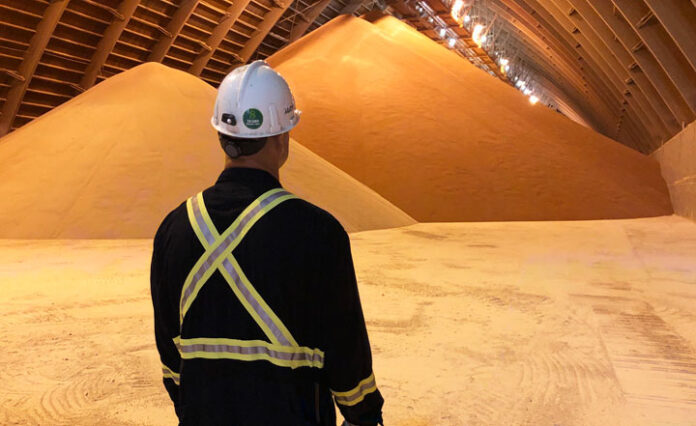The Canadian company that is the largest fertilizer producer in the world is watching its stock price soar this week amid market worries that the war in Ukraine could exacerbate a global supply shortage.
Shares in Saskatoon-headquartered Nutrien Ltd., which was created in 2018 as a result of the merger between PotashCorp of Saskatchewan and Calgary-based Agrium Inc., were trading at $108.47 on the Toronto Stock Exchange Tuesday morning, up 14 per cent since last week, when Russia invaded Ukraine.
Nutrien shares have climbed 55 per cent year-over-year, as global demand for fertilizer already exceeded supply prior to this week’s geopolitical crisis. Now markets are jittery the supply shortage could get worse, because Russia and Ukraine are major fertilizer-producing countries.
“There’s a good chance that sanctions by western countries on Russia are going to impact trade,” said Matt Arnold, financial analyst with Edward Jones.
“If that’s the case, with Russia being a major exporter of many types of fertilizer, that’s just going to make global supplies that much tighter.”
Nutrien isn’t the only fertilizer producer making gains this week. The Mosaic Company — which is based in Tampa, Fla., but owns two potash mines in Saskatchewan — has seen its share price climb as have other global producers, such as Illinois-based CF Industries Holdings Inc.
But Nutrien is significant not just as a Canadian company, but also because of its sheer size. The company is the world’s largest potash producer with over 20 million tonnes of capacity at six potash mines in Saskatchewan. It also has two large phosphate mines in the U.S., and is the world’s third-largest producer of nitrogen. (Potash, phosphate and nitrogen are the three main plant nutrients used in commercial fertilizer.)
Nutrien declined an interview request, but company spokeswoman Megan Fielding said in an emailed statement last week that the company increased its potash production by almost one million tonnes in 2021 in response to market demand, and will increase production of both potash and nitrogen in 2022.
“We cannot predict the impact that geopolitical events may have on the global market, however we continue to monitor the situation and do our part to ensure our customers get what they need,” Fielding said.
Trending Stories
Donald Trump takes aim at Justin Trudeau, accuses him of undermining democracy
Kenney confirms plans to drop vaccine mandate for healthcare workers
Both Russia and Ukraine are also major global suppliers of agricultural commodities, particularly wheat. That means the conflict in Ukraine has also sent wheat futures skyrocketing to highs not seen since 2008.
Arnold noted that high wheat prices will put even more pressure on the cost of fertilizer, as farmers are likely to plant more acres and spend more in an effort to maximize yields.
“Farmers across the U.S. and Canada are major wheat producers, and they’re going to be very motivated to pursue those elevated wheat prices,” he said.
As of yet, Russian fertilizer companies have not been targeted by western sanctions and it’s not clear whether they actually will be, Arnold said. Food inflation is already a top-of-mind issue in many parts of the world, and Western governments may be hesitant to do anything that will add to the problem, he said.
“I don’t think it’s safe to just assume that it’s going to happen to fertilizer, that fertilizer’s going to be impacted,” Arnold said. “The market’s largely saying it’s likely, that’s why stocks like Nutrien are up, but it’s still really early days and everyone’s trying to find out what this means.”
In an emailed statement, federal Agriculture Minister Marie-Claude Bibeau said she is keeping a close eye on the situation.
“Fertilizer prices are already high and the war is an additional element of pressure which could have further impact on the input costs,” Bibeau said. “We are monitoring the situation very closely.”
Also watching closely are Canadian farmers like Dave Bishop, who farms near the village of Barons in southern Alberta. Bishop has already pre-purchased his fertilizer for the coming growing season, but he said if the Ukraine conflict drags on, it will be a concern for the agriculture industry.
“It’s a worry,” Bishop said, adding his fertilizer costs have nearly doubled year-over-year, and now represent his No. 1 input cost. “(Fertilizer) is one of those costs you have to have, if you’re going to make a profit. You just have to try to manage it the best you can.”
Consumers should also be watchful as the price of groceries may be poised to head higher, said Sven Anders, professor of agriculture economics at the University of Alberta. He pointed out that spiking costs of inputs like fertilizer, combined with sky-high commodity prices and the reverberations from last year’s intense drought could combine to produce “the perfect storm” when it comes to food inflation.
“We have been talking about consumer inflation for some time now, and guess what? It’s not going to go away,” Anders said. “It will be interesting to see how grocery retailers handle this.”
© 2022 The Canadian Press



